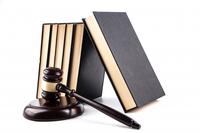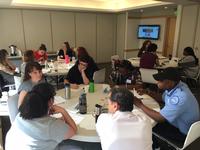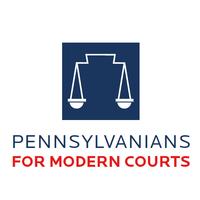Expanding Legal Literacy in Neighborhood Libraries
By Community-Centered LibrariesStorm Rhodes is a Library Assistant at the David Cohen Ogontz Library, and a member of Cohort 1 of the Skills for Community-Centered Libraries training. In this post, she shares what she has learned.
The most influential things I have learned from being a part of Cohort 1 of the Skills for Community-Centered Libraries trainings were mapping my community, keeping cultural icebergs in mind, and exercising my strengths as a researcher and visionary.
So often we look only at what’s in front of us, and as a result we fail to see what’s around us. Learning about community asset mapping helped to see what was around me beyond the other institutions and businesses. The combination of mapping and awareness of the iceberg (the idea that you don’t know about that lies under the surface for other people) is valuable. Mapping deals with the community and icebergs deal with the people. Everyone has a story, so I set out to learn the story of my community and the people who live in it. These stories serve as the fuel for my project.
As I listened to the stories of people in my neighborhood, three branches of law emerged often: family, landlord/tenant, and criminal. These are huge topics, but I believe that the Free Library of Philadelphia is in a unique position to help our patrons foster better relationships with judicial entities by being on the front lines of both pre-entry (prior to incarceration) and re-entry afterward.
A core value of the Free Library of Philadelphia is to advance literacy. In the digital age, this core value is one that is redefining itself, and as library staff we have to adapt with the times. Literacy is no longer confined to what’s read in books but rather what’s understood and accurately applied in the life of our patrons. It is my earnest desire to help people understand the world in which they live in order to flourish in every area. One area in which literacy needs to expand is the legal system.
What is legal literacy? According to ruleoflaw.com, "when citizens, particularly marginalized or underprivileged groups, know what the law has to offer them, they can recognize and challenge injustices more forcefully." The first step towards that knowledge of the law, which can transform people’s lives, is legal literacy.
The Free Library already has a good start on introducing legal literacy through partnerships with Pennsylvanians for Modern Courts and the Young Lawyers Division of The Philadelphia Bar Association. Blackwell Regional Library and Parkway Central Library have hosted "Know Your Courts" Workshops and Free Legal Consultations. These workshops can be expanded and tailored to all libraries to help our patrons formulate a plan built on knowledge and confidence when faced with legal issues. I set out to learn how to best achieve this.
Realizing that laws differ from county to county, state to state, and certainly country to country I set out to find a model that would help facilitate the learning process in a simple way. I found one that’s used in Australia called ILACS and is broken down as follows:
- I = Identify the legal issue if there is one.
- L = State the relevant Law Statute or Case Law.
- A = Apply the FACTS of the situation in accordance with the law.
- C = Expect a confident legal outcome or prepare for a continuance.
- S = Have a strategy before, during or after a legal encounter.
If we can tailor our legal workshops to fit the ILACS model, we will in effect be arming our patrons with a more confident expectation when facing legal issues. We would be moving them from head knowledge of what court to go to, into a working literacy of what to do, what to expect, and how to prepare.
I hope to launch the first of three Legal Literacy Woke-shops at David Cohen Ogontz Library this summer. I’m grateful to Free Library management staff for giving me this opportunity to build better communities through literacy.
This project was made possible in part by the Institute of Museum and Library Services [Grant #RE-95-17-0089-17].
Have a question for Free Library staff? Please submit it to our Ask a Librarian page and receive a response within two business days.



